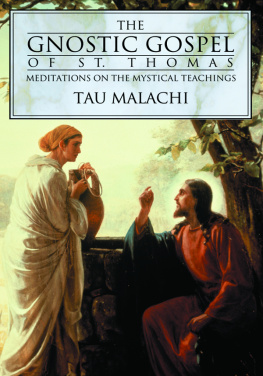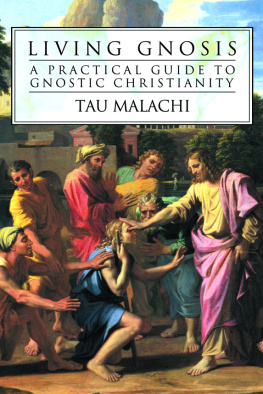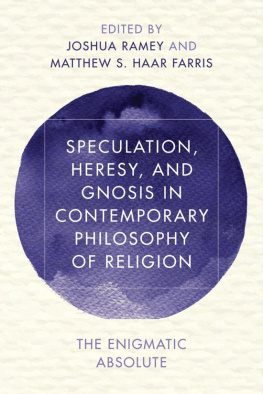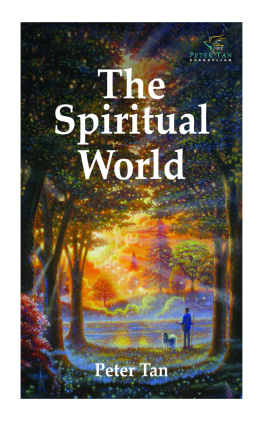From New Age
to New Gnosis
From NEW AGE
to NEW GNOSIS
The Contemporary Significance
of a New Gnostic Spirituality
Peter Wilberg
New Gnosis Publications
First published by New Gnosis Publications
www.newgnosis.co.uk
2003 Peter Wilberg All rights reserved.
2017 amended edition
The right of Peter Wilberg to be identified as the author of this work has been asserted by him in accordance with the Copyright, Designs and Patents Act, 1988.
ISBN 1-904519-07-5
There is a wordless knowledge within the word.
SETH
How is it still possible to preserve a tradition which may have to survive underground for a long time?
Martin Heidegger
He who possesses gnosisis like a person who, having been intoxicated, becomes sober, and having come to himself, re-affirms that which is essentially his own.
The Gospel of Truth
Whoever has not known himself has known nothing, but he who has known himself has at the same time achieved knowledge of the depth of all things.
The Book of Thomas
However vast outer space may be, yet with all its sidereal distances it hardly bears comparison with the dimensions, with the depth dimension of our inner being , which does not even need the spaciousness of the universe to be within itself almost unfathomable
Rainer Maria Rilke
Inside every human being is a gigantic, dark lake of silent knowledge which each of us could intuit.
Carlos Castaneda
And there shall be others of those who are outside our number who name themselves bishop and also deacons, as if they have received their authority from God. They bend themselves under the judgment of the leaders. Those people are waterless channels.
The Apocalypse of Peter
Contentslist
Gnosis, Old and New
Prologue
The Old Gnosis was a form of subversive theo-politics. This took the form of a spiritual critique of the ruling gods of the era - the gods of both Old and New Testament orthodoxy, of Greek paganism and Roman imperialism. Along with this spiritual critique went political opposition to the priestly and political powers or archons which represented these gods and their theologies.
The New Gnosis is a theo-political critique of the ruling secular and cultural gods of our era, and of the social-economic cultures and scientific cults that support them. It calls into question the gods called energy and the eternal gene, the New Age cult of energy medicine, the medical cults of human genomics and nanotechnology - and the global corporations and stock exchanges which promote them. New Gnosis is a spiritual-political spear aimed at the foundations of global neo-conservatism and neo-imperialism, and challenging all four faces of its famous pyramid - the dollar, the idolatry and i-dollartry of new technologies, the politically illiterate platitudes of New Age spirituality, and the historically illiterate literalism of Christian fundamentalist bible-worship or bibliolatry - which now sees its own face reflected in the deathly clash of Islamic and Zionist fundamentalisms.
In the words of Karl Marx, through theo-political critique the critique of heaven is transformed into the critique of earththe critique of theology into the critique of politics. In New Gnostic theo-politics the critique of politics becomes once again a critique of old and new theologies and god-concepts. This particular work of theo-political critique, like those of Marx, does not take the form of a theoretical treatise produced as an academic end in itself. Rather, as Marx put it: Its subject is its enemy It no longer acts as an end in itself but only as a means . Its essential emotion is indignation . Its essential task is denunciation . The enemy of gnosis is not a group of persons or an economic class, nor is it some social or spiritual power of evil. It is quite simply spiritual ignorance or agnosis - whether this takes the form of supposed scientific knowledge , religious agnosticism or dogmatic ideologies.
Lifting the Veil
In the centuries immediately preceding and following the birth of Christ, a multi-cultural mix of races co-existed under the political sway of the Roman empire and its vassals, along with a medley of spiritual mythologies and theologies - a medley mirrored in todays New Age pick-and-mix assortment of ancient spiritual traditions and new fangled therapies. Then, as now, the main concern of the ruling powers of the day was only to ensure that no coherent spiritual movement emerged which in any way challenged their political authority or the military hegemony. But the spiritual key word of the day was not therapy or healing but redemption. This word, however, did not mean salvation from sin but freedom from slavery to the ruling military-political powers and their religious servants.
Thus it was that in closest secrecy small circles of initiates formed covert spiritual cells whose purpose was to quietly educate others in a new and radically different religious philosophy. This philosophy, unlike the New Age style medley of gods and religions that preceded it, was indeed spiritually and politically subversive. Its sheer spiritual power was a covert challenge to the ruling military-political powers. For it was capable of restoring a sense of authentic spiritual communion between individuals that transcended the ethnic, class and cultural divisions on which those powers rested.
One outcome of the work of these initiates was the birth of a Christianity which very soon deformed itself into a personality cult of saviour worship and redemption from original sin. Another, less visible outcome was the continued survival of a powerful underground spiritual tradition - the gnostic tradition. This tradition had begun with the secret cells of initiates - spiritual teachers who taught that the key to salvation lay neither in political rebellion nor in redemption from sin, but rather in overcoming spiritual blindness and ignorance. In place of this ignorance they offered knowledge or gnosis - not in the form of dogmas but in the form of direct spiritual experiences undergone by individuals through initiation.
For those in the business of creating a new structure of spiritual-political and cultural-communal authority - the Church - gnostic Christianity became a threatening the0-political heresy . The official canon of Christian gospels were carefully selected to remove as many traces as possible of the gnostic message or gospel that Christ had been chosen to publicly enunciate and embody. Direct and shared subjective experience and knowledge of spiritual reality through individual experience was regarded as inherently suspect and replaced by official rites or sacraments which merely symbolised that subjective knowledge..
In todays world however, knowledge is something identified solely with academic studies and science, whereas religion is seen as a matter of belief or faith, culture or community. All claims to knowledge that fall outside its officially sanctioned sources - science and academia - are deemed to be unscientific rather than heretical. Nevertheless, the very idea that there is or could be such a thing as subjective knowledge is of course sheer scientific heresy in modern scientific terms. The fact that we no longer see any scientific truth in direct subjective experience - not least spiritual experience - is testament to the spiritual ignorance or a-gnosticism fostered by centuries of institutionalised Christianity.
The official churches fulfilled the function of nurturing and sustaining a communal spirituality based on personal faith and sacramental rites. The underground anti-church of traditional gnosticism focused on the enlightenment of the individual through initiation in secret societies. But as Martin Buber emphasised:








